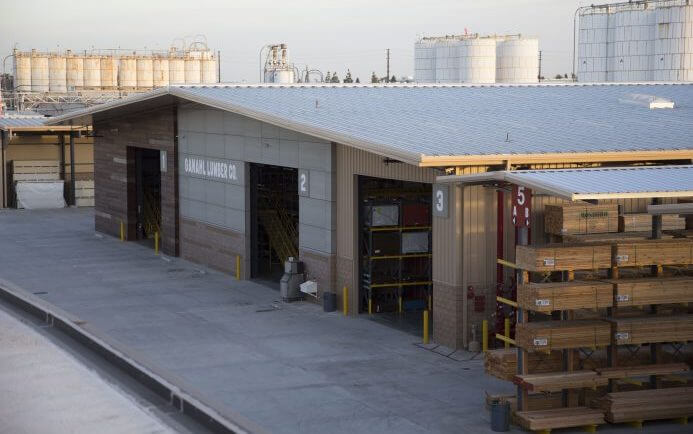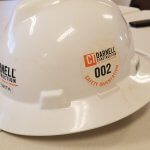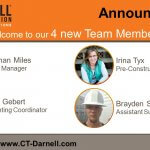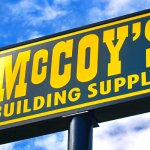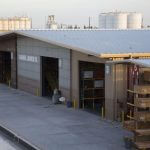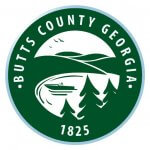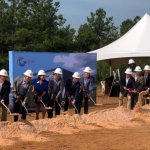
Ganahl Lumber has been planning its latest facility for almost 15 years. Not literally planning it, of course, but always searching for the perfect location near Los Angeles’s South Bay.
In 2013, the perfect location finally opened up and Ganahl sprang into action.
“We found it in 2013 and closed in 2015 and opened in 2017,” says Tom Barclay, general manager of the new, Torrance, Calif., plant. “It took about five years from the time we closed escrow to the time we got it open. It’s a big investment.”
Ganahl’s investment and strategic focus in the Torrance campus reflect a profound shift in the way firms generate value in the pro dealer construction work stream. As automation, data, and technology impact resource allocation, timing, precision, customer service, and inventories, these operational pillars play ever greater roles as non-negotiables among customers in a value stream that’s getting challenged in the cost front by materials tariffs, labor capacity constraints, and other expense increases. What Ganahl and other progressive companies are responding to is the need to develop their value proposition beyond the “table-stakes” baseline of product and SKU stocks and customer-centric services. The new must-have and differentiator in the value stream is “experience”—which gives building-channel users a clear sense they’ll both avoid costly errors and gravitate toward more profitable practices.

For Ganahl, the new address—designed and built by Alpharetta, Ga.—based CT Darnell Construction—puts the company in an ideal spot to serve its existing customers. For years, business was growing in the Los Angeles market and clients getting deliveries would mention they’d love to be able to pick up closer to their jobsites. In fact, an estimated 40% of the business at the new location comes in as will-call pickups. Thus, the facility was designed to ensure a smooth experience for all customers.
“We built almost two yards,” says Barclay, referring to the almost entirely separate functionality of the operating areas. “The back of the house—shipping, receiving, milling, railcar site—that operates independently from the customer yard. They don’t have to mix with our delivery vehicles, and we’re not waiting behind them. Shipping and will-call don’t have to mix.”
If that sounds like a sizable operation, it’s because it is. For starters, there’s the 46,000-square-foot retail store, along with a 38,000-square-foot drive-through lumber building, in addition to 56,000 square feet of covered lumber and building material storage.
Add to that a 19,000-square-foot milling facility, the first of its kind for Ganahl. The plant is so impressive in its magnitude and construction that clients compare it to the major themed magical attractions in the area.
Just because the facility has 18 acres to work with doesn’t mean the buildings were placed without regard to optimizing design, however. Our ProSales Excellence judges were particularly keen on how the operation maximized space with designs such as the on-roof parking lot. That efficiency comes from years of acquisitions and lessons learned from Ganahl’s Anaheim, Calif., headquarters, built in 1977.

“We’re fortunate that they built Anaheim, our headquarters, in 1977. It’s a similarly-sized parcel that was truly state-of-the-art, 18 or 19 acres, at the time,” Barclay says. “[We asked ourselves], ‘What’s working and what do we want to copy?’ We’ve had a little bit more practice in remodeling stores. Taking those things, [we learned] how to build the best possible site.”
A priority in the design, functionality, and operational capabilities of the Torrance facility has been Ganahl customers’ experience during the whole time within its gates. At every turn, the attempt is to create a value stack around the notion of product, service, and user experience that will set the company apart from other local building materials and product sources, delivering a higher-grade set of price, efficiency, and service values.
One way the plant is improving on the older site is through its approach to the gate guard’s role and function in creating a favorable experience for the customer from the get-go. The new gate-guard building is larger than Ganahl facilities of earlier periods and has a computer and a cash register for whoever staffs the station. An employee is the first person to greet customers when they enter and the last to say goodbye.
“When the customer pulls in, the guard can say, ‘Hey, what are you picking up today?’ and can get on his radio and say, ‘He’s coming over,'” Barclay says. “That’s a job where we used to put a guy who might be injured on the gate. Instead, we’re looking at it to give a great first impression and, always, a last impression.”
Customers can also minimize the time they have to spend at the yard with Ganahl’s 90-minute prepull program. They can call, text, email, fax—whatever’s easiest—and Ganahl will pull, tag, and prep the order in 90 minutes or less. Customers then just have to sign the paperwork and are ready to go. Barclay’s estimates that around 50 of 60 prepull orders are processed each day and more and more customers are taking advantage of the program. And word continues to get out about the new facility, with more existing clients visiting the location and new customers coming in all the time.
“I had one guy who came up about a month ago and said, ‘I really like this place, but I really liked it when I was the only customer here!'”
ProSales salutes Ganahl’s ahead-of-the-curve recognition that, these days, it takes more than products and service to stand above and beyond alternative outlets and sources for builder clients. Customer experience is now a must-have as the kind of differentiator hat can sway decisions away from a commodity mentality toward a willingness to pay more and remain loyal.
As one of our ProSales Excellence Awards jurors noted, even the facility’s approach to parking is customer centric. “[It has] a unique design with a parking lot on top of the store for employees and vendors, leaving the lower parking lot for customers.”
It’s the firm, like Ganahl, that helps its customers become what they’re trying to be, as smart, nimble, time-stressed, profitable firms that distinguish themselves from the rest. That’s why Ganahl’s investment in it’s new Torrance plant serves as a classic case study in strategic, customer-centric business culture and leadership.

